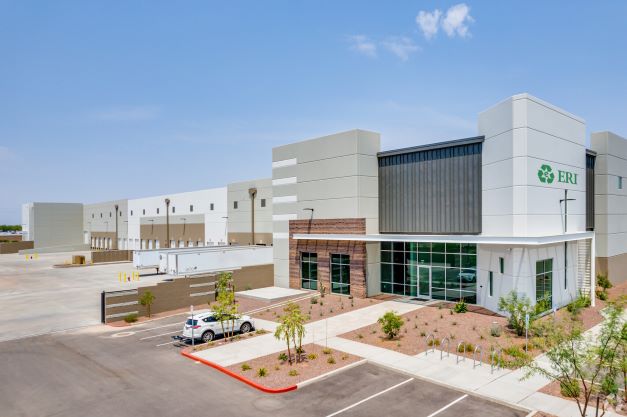
The recently opened facility in Goodyear, Ariz. will focus on front-end processing of incoming equipment, as opposed to downstream shredding and separation. | Courtesy of ERI
ERI has opened a processing facility outside of Phoenix, marking the company’s ninth U.S. plant and its first in the southwest region. The company’s CEO said more recycling locations are coming.
In December, ERI held a soft opening for its recycling and ITAD processing facility in Goodyear, Ariz., which is a Phoenix suburb. The leased space, which is just over 100,000 square feet and is located in a brand new building, has data destruction, reuse/refurbishment and recycling capabilities.
“This is a very underserved market, is what we’re finding,” John Shegerian, ERI’s co-founder, CEO and chairman, said in an interview with E-Scrap News.
Shegerian said three different clients asked ERI to open a processing facility in the area, with the companies citing logistics challenges as driving the need for a local plant. The three companies, which are very different brands that aren’t involved with each other, all shared the message with ERI within about a 100-day period, he said.
The facility in Goodyear represents an investment of over $2 million, Shegerian said. Within a year, ERI aims to employ 75 people on two shifts or a shift and a half at that location, he said.
Much of the latest technology in the facility is focused on front-end processing of the ITAD stream, not downstream shredding and separation of end-of-life equipment. For example, the plant doesn’t have a large shredding and separation system or commodities-recovery robots that ERI uses at some of its other plants.
But Goodyear does sport the company’s recently released technology for processing incoming ITAD stream equipment, called SOAR, which was originally unveiled in April 2022 and then had an updated iteration announced in December. SOAR uses proprietary software with AI capabilities to work toward automating the process of capturing data on incoming IT equipment and triaging it into reuse or end-of-life streams. Equipment is placed under a camera, and the computer captures the make and model. Then, after referencing a database of over 13,000 SKUs, the system informs the technician whether it’s resellable or has reached its end of life.
“It’s improved production speeds, quality of service, quality of client happiness,” Shegerian said. ERI plans to automate the sorting steps with robots later this year, he said.
Achieving carbon neutrality in operations
ERI also noted that the Goodyear facility, as well as other facilities throughout the company, are now carbon neutral for their operational emissions.
A year ago, ERI published its first environmental, social and governance (ESG) and data security report, which detailed the company’s GHG impacts. At the time, the company estimated its Scope 1 direct emissions (such as ERI’s capital goods, purchases of goods and services, energy use, etc.) totaled 2.47 million pounds of carbon dioxide-equivalent (CO2e). Its Scope 2 and 3 indirect emissions (both upstream and downstream impacts) totaled 45.9 million pounds of CO2e.
Paul Williams, ERI’s vice president of communications and media relations, said ERI is now carbon neutral for Scopes 1 and 2 emissions. “We are working with our partners and vendors to help them improve their own carbon footprint in an ongoing effort to be able to announce Scope 3 neutrality soon,” Williams said.
Shegerian said the company has done what it can to offset its emissions through steps such as using EVs, installing solar power on buildings, and purchasing green power. For the remaining impacts, it purchases carbon credits through CO2.com, which invests money in projects that reduce CO2 emissions.
“We’re the first recyclers on the planet in our space to be carbon neutral, and that means a lot to our clients. We know it does, they’ve told us so,” Shegerian said. But the effort isn’t about gaining a competitive advantage, he said, calling it an aspirational effort to inspire other companies.
“This is not a Game of Thrones atmosphere when it comes to environmental services,” he said.
Looking forward to growing
The Goodyear space is the ninth processing location for Fresno, Calif.-based ERI, which has others in Fresno; Aurora, Colo.; Plainfield, Ind.; Holliston, Mass.; Badin, N.C.; Lincoln Park, N.J.; Flower Mound, Texas; and Sumner, Wash. The company also has branch offices in Columbus, Ohio; New York City; and Raleigh, N.C.
The company is now searching for a space in the southeastern U.S. for a recycling plant that will hold a “monster” shredding and separation system, Shegerian said. ERI uses such systems at its Fresno, Plainfield and Holliston plants.
The company will likely be ready to announce that new southeast location in early 2024.
ERI serves international customers by striking partnerships with processors outside the U.S. But the company is now looking to install its own recycling facility abroad, he said, estimating it would happen within about a year and a half.
When asked about nervousness investing money expanding the company’s footprint at a time of widespread concern about a deepening recession, Shegerian said ERI has no concerns.
“We don’t believe there’s going to be a recession, No. 1. And No. 2, old electronics don’t watch Bloomberg or CNBC. They need to be recycled,” he said.
He said 2022 was ERI’s best year in terms of revenue and profit, despite disruptions such as the war in Ukraine and China’s coronavirus lockdowns. Since then, China has lifted its “zero-COVID,” policies, and commodity and ITAD prices are trending upward, he said. ERI’s financial numbers are on pace to beat last year, he added.
“We’re zero concerned about the nonsensical talk about recession,” Shegerian added, “because it’s all just noise.”